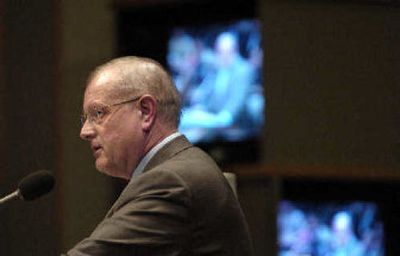West’s data to stay secret – for now

A cloak of secrecy was placed Tuesday over the City Council’s investigation of alleged “workplace misconduct” by Mayor Jim West.
A private investigator, hired with $15,000 in taxpayer money, struck a deal that will allow him to secretly examine the contents of the mayor’s city-owned computer, but not publicly discuss the findings.
Under the agreement, West will have 10 days to take legal action to block public release of the investigator’s final report after it’s delivered to the City Council. If West does not intervene within the 10 days, the council is free to publicly release the findings.
Investigator Mark Busto also is examining published reports that West was involved in “improper conduct” by offering city jobs and appointments to young gay men he met online.
The “protective order” apparently was struck without direct involvement by the City Council, even though individual members knew it was in the works.
City Council President Dennis Hession said Tuesday evening the legal agreement will allow Busto, a Bellevue attorney, to more-expeditiously examine the mayor’s computer files and finalize a report on whether he violated city policies or ethics.
“It will provide the investigator with the opportunity to examine this information, unencumbered by a suit that asks if the material is public record,” Hession said.
“I’m a little distressed that there’s this cloak of – I don’t want to say ‘secrecy,’ ” said City Councilman Al French. “I just wish the outcome had been different.”
French said his goal has been to “inform the public” about various allegations surrounding the mayor since they first surfaced in May.
Councilwoman Cherie Rodgers said the council should have had input on the agreement.
“I don’t think it should have been done this way,” Rodgers said Tuesday night. “It’s easy to do the public’s business behind the scenes like this, but it’s another to do it out in the open where government business should be conducted.”
The agreement is “another in a series of stall tactics preventing the public from knowing the mayor’s X files,” she said.
Busto and West’s attorneys, Bill Etter and Susan Troppmann, reached the agreement on Tuesday, one day before a Superior Court judge will be asked to make the computer files public.
Attorneys for The Spokesman-Review will ask visiting Superior Court Judge Richard Miller today to rule that the contents of the mayor’s City Hall computer should be public record, in accordance with written city policies for all employees.
The newspaper’s attorneys also are expected to oppose the protective order, agreed to by Busto, his legal colleague Edward Taylor, and West’s attorneys.
“A promise of confidentiality cannot exempt a document from disclosure under the state’s Open Public Records Act,” said attorney Tracy LeRoy, who represents the newspaper.
Under the deal, Busto will be given a copy of three CDs copied from the mayor’s computer, which was seized in early May.
The computer files contain pictures of young gay men and sexually explicit correspondence on the mayor’s computer, according to court documents.
The protective order will “expire and be of no further effect” if Judge Miller rules that the contents of West’s computer are public record, according to the agreement.
Busto was hired in early September by the City Council, which promised a thorough public investigation after a five-member investigative panel, appointed by then-City Attorney Mike Connelly, collapsed amid conflict-of-interest charges.
“There’s really no secrecy about it,” Hession, himself an attorney, said of the need for the protective order. “The issues before the council are very different from the public records issues raised by the newspaper.”
Hession said the contents of West’s City Hall computer should be made immediately available to Busto, who is conducting an internal investigation to determine if policies were violated.
“Our issue is not whether they are public records,” Hession said. The city’s position, he said, is that its investigator should have immediate access to material on the government computer as part of an internal investigation involving a city employee.
The issue of whether to allow Busto to enter into the agreement with West’s attorneys “was not discussed by the council,” Hession said.
The protective order applies to the files and data on West’s computer Internet cache and to files or fragments in the unallocated space on the mayor’s computer hard drive.
The newspaper also is seeking a cloned copy of West’s computer disc to see what deleted files may be recovered with a forensic examination.
Under the agreement, Busto’s investigative report “may refer to and describe” the material he examines on West’s computer. But if the report contains those details, the investigative findings will be provided only to the City Council, its legal counsel, and to West’s attorneys, and can’t be publicly disclosed for 10 days.